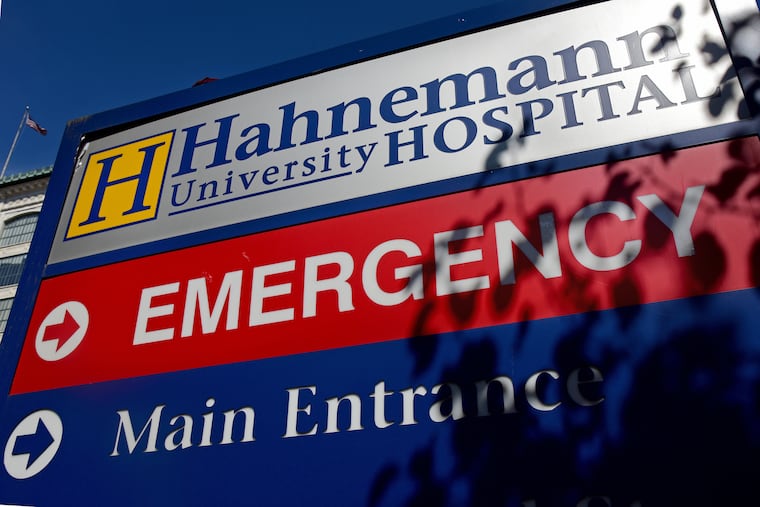Drexel president announces job losses for clinical faculty and staff due to Hahnemann closure
Drexel University's president has announced job loss for about 40 percent of clinical faculty and staff as a result of Hahnemann hospital's impending closure.

About 40 percent of Drexel University physicians and clinical staff will lose their jobs as a result of the planned closure of Hahnemann University Hospital, Drexel president John Fry announced in an email to the university staff Thursday morning.
For weeks, clinical staff and employees at the university’s medical college have been wondering what the sudden closure would mean for their jobs. Fry said it left the university’s physicians’ practice, Drexel Medicine, at “a crisis point.”
“We have been forced to make extremely difficult decisions," Fry wrote, "but please know that the long-term goal is to preserve as many clinical faculty and professional staff jobs as possible.”
Fry said that Tower Health Medical Group will become the college’s new partner and will be able to offer approximately 60 percent of the 800 clinical faculty and staff within the program employment in their current jobs. Tower also expects to be able to offer about half of the remaining 40 percent comparable positions at similar pay at Tower locations in Reading, Chestnut Hill, and the Philadelphia suburbs, said Jill Tillman, CEO and associate dean of Drexel University Physicians.
The 800 clinical faculty and staff include 245 physicians who received severance notices on Thursday, though many of them will be offered employment through Tower, Tillman said. Tower has offered to keep all primary care physicians, she said, minimizing disruption to patients.
“I think they’ve been incredible partners to us and incredibly civic-minded partners,” Tillman said.
Among other employees in the group of 800 are lab technicians, medical assistants, oncology nurses and patient navigators, she said.
While the university is looking to cease ophthalmology operations, officials are talking to another entity who may take it over, Tillman said. Tower does not offer ophthalmology, she explained.
Earlier this month, Hahnemann said it plans to transfer the majority of its medical residents and fellows to Tower Health. But that six-hospital system does not have all the accredited training programs it would need to accommodate Hahnemann’s 500-plus residents. The plan is also subject to approval by U.S. Bankruptcy Court, which has scheduled a hearing for Friday.
Drexel plans to eliminate certain health-care service lines as a result of the closure, Fry said.
In a separate email to staff on Thursday, Drexel senior vice president for medical affairs Daniel V. Schidlow provided some details about which medical services Tower would seek to retain. Family medicine and internal medicine, including primary care, would continue in their current Drexel Medicine practice locations. Tower wants to meet with physicians and clinical staff in emergency medicine, surgery, cardiology, and other specialties “about employment opportunities” within Tower’s system.
Tower’s Chestnut Hill Hospital — its only property in Philadelphia — does not have a maternity unit, but Schidlow said Drexel’s obstetricians and midwives may be offered jobs within the Tower system.
Hahnemann and St. Christopher’s Hospital for Children were bought from Tenet Healthcare Corp. early last year for $170 million by Joel Freedman, a California investment banker and chief executive of American Academic Health System. He faced financial turmoil almost from the start, culminating with the bankruptcy filing late last month by Philadelphia Academic Health System, the entity that owns the hospitals. St. Christopher’s physicians and clinical staff are not affected by Drexel Medicine’s action.
Drexel officials have emphasized that the medical college with its main campus on Queen Lane and an enrollment of nearly 1,900 students will remain open. The program receives 15,000 applications annually for 260 spots, Fry said.
Third- and fourth-year medical students who had been involved in clinical training positions at Hahnemann will be reassigned to one of 20 other clinical settings in the region, Fry said.
The university’s graduate school of biomedical sciences and professional studies will not be impacted, he wrote. The reorganization also will not affect basic science faculty or professional staff in the college of medicine, Fry said.
“As we work through this extremely difficult transition, we want to stress that we are fully committed to continuing our educational, research and clinical missions as we emerge stronger as a college of medicine – and as a university,” Fry wrote.
St. Christopher’s and Hahnemann both are part of the recent Chapter 11 bankruptcy filing by Philadelphia Academic Health System, which aims to close Hahnemann on Sept. 6, though certain services already have stopped. Hahnemann has given up its trauma center designation, is not accepting critical cases, and is no longer admitting inpatients through the emergency department. It also has stopped delivering babies.
A lawyer working on the bankruptcy said Wednesday that the purchase price for St. Christopher’s would likely be revealed soon. The case’s next court date is Friday. Einstein Healthcare Network, Jefferson Health, Philadelphia College of Osteopathic Medicine, and Temple Health said Wednesday that they had formed a consortium to explore purchasing St. Christopher’s.